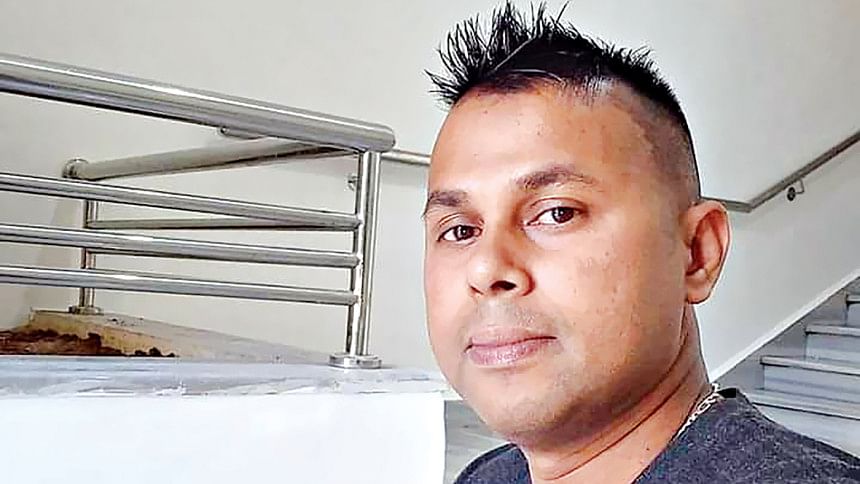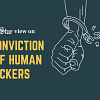Penniless, scarred for life after perilous passage

"They demanded Tk 6 lakh from me. My family, already burdened with debts, took two days to arrange the money. As a punishment, they pulled out a toenail."
When Mustakim Sarkar boarded a flight from Dhaka airport in February 2024, he dreamt of a decent life in Italy.
He spent all of his savings and took loans to be able to give Tk 18 lakh to a group of people he thought were overseas employment agents.
The 40-year-old father of three from Dhaka's Keraniganj thought once he reached Europe, he would find a job and earn enough to repay the loans and support his family back home.
But, he found himself held captive in Libya by human traffickers. He was tortured for months and his family had to incur more debts to pay the ransom the traffickers demanded.
Yesterday morning, Mustakim and four other victims -- Mozammel Haque of Sherpur; and Jihad Fakir, Roman Howlader, and Yasin Howlader of Madaripur -- arrived at Hazrat Shahjalal International Airport from Algeria.
Mustakim said a man of Keraniganj lured him with promises of a legal passage to Italy.
"After I paid them, they took me to Dubai. I had a visitor visa. They first took me and the others to a camp in Ajman. Then I was taken to Egypt, and eventually to Libya. The five of us thought we had reached Italy when we landed in Libya," he said.
But the traffickers took them to a squalid warehouse infested by bedbugs and lice. Several hundred others were cramped inside the facility in Benghazi.
"They used to give us a small meal twice a day and saline water for bathing, which caused severe skin problems."
After a week, Mustakim and 45 others were herded into microbuses and driven to a remote location late at night.
"They kept us locked in a dark room for an hour before taking us to a seashore. Anyone who opened their mouths were hit with gun butts."
A man in a military uniform appeared on a boat, and the 46 men were asked to board the small boat. After navigating for 15 minutes, the man in uniform handed one of them a map and jumped into the sea.
After two days of being lost at sea, they were intercepted by what he believed was a boat of Libyan armed forces.
Their passports, money, and belongings were confiscated.
"We were promptly sent back to Benghazi and held in another camp with 100 others. That's when the nightmare began. Beatings with sticks were routine. Meals, when provided, consisted of little rice, a few onions, and green chillies."
After a week, the guards stripped Mustakim and 19 others and locked them in a toilet.
"They demanded Tk 6 lakh from me. My family, already burdened with debts, took two days to arrange the money. As a punishment, they pulled out a toenail from my left foot."
Once the ransom was paid, the traffickers left. "I ran through the desert at night until some army personnel caught me. They beat me up first and then sent me to Algeria where I was imprisoned for three months."
Mustakim pleaded with the Algerian authorities to contact his family.
His wife, Sharmin Akhter, reached out to BRAC, whose intervention finally paved the way for their return home.
"I thought I was securing a future for my family. Instead, I brought back scars and debts," he told this correspondent.
BRAC took assistance from the foreign ministry, Wage Earners' Welfare Board, and the Trafficking-in-Persons Hero Network to repatriate Mustakim and the four others, said Shariful Hasan, associate director of the BRAC Migration Programme
"Those taken to Libya with promises of jobs in Europe get cheated. Most of them are detained in camps in Libya, where they are subjected to torture. They are then held hostage by gangs seeking ransom. Despite all this, there is a trend of people going to Libya, hoping to travel across the Mediterranean to Europe," he said.
Public awareness campaigns can end the crisis, he said.
"Local brokers and human trafficking networks must be identified. Operations should be carried out by law enforcement agencies. In particular, financial transactions must be traced," he said, adding, "Without a collective effort, this crisis cannot be resolved."

 For all latest news, follow The Daily Star's Google News channel.
For all latest news, follow The Daily Star's Google News channel. 








Comments